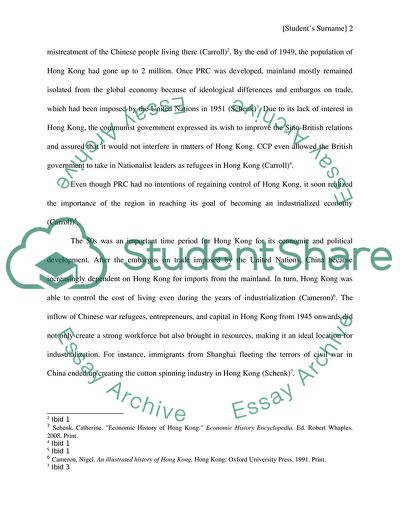Cite this document
(How did Hong Kong Rebuild its Prosperity after the Communist Victory in 1949 Essay Example | Topics and Well Written Essays - 2750 words, n.d.)
How did Hong Kong Rebuild its Prosperity after the Communist Victory in 1949 Essay Example | Topics and Well Written Essays - 2750 words. https://studentshare.org/history/1814444-how-did-hong-kong-rebuild-its-prosperity-after-the-communist-victory-in-1949
How did Hong Kong Rebuild its Prosperity after the Communist Victory in 1949 Essay Example | Topics and Well Written Essays - 2750 words. https://studentshare.org/history/1814444-how-did-hong-kong-rebuild-its-prosperity-after-the-communist-victory-in-1949
(How Did Hong Kong Rebuild Its Prosperity After the Communist Victory in 1949 Essay Example | Topics and Well Written Essays - 2750 Words)
How Did Hong Kong Rebuild Its Prosperity After the Communist Victory in 1949 Essay Example | Topics and Well Written Essays - 2750 Words. https://studentshare.org/history/1814444-how-did-hong-kong-rebuild-its-prosperity-after-the-communist-victory-in-1949.
How Did Hong Kong Rebuild Its Prosperity After the Communist Victory in 1949 Essay Example | Topics and Well Written Essays - 2750 Words. https://studentshare.org/history/1814444-how-did-hong-kong-rebuild-its-prosperity-after-the-communist-victory-in-1949.
“How Did Hong Kong Rebuild Its Prosperity After the Communist Victory in 1949 Essay Example | Topics and Well Written Essays - 2750 Words”. https://studentshare.org/history/1814444-how-did-hong-kong-rebuild-its-prosperity-after-the-communist-victory-in-1949.


